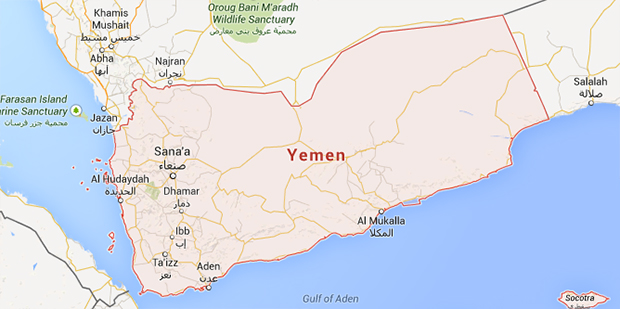|
Yemen is not a country known for sectarian conflicts, in fact, it has been quite the opposite. While talking to my Yemeni friends I was fascinated to learn that the Yemeni’s are very tolerant people, they allow free practicing of religions and various Islamic ideologies; that there are no separate masjids for Shia’s and Sunnis; that the people stand for the right of each religion and freedom of speech. Now that there are different circumstances, it remains to be seen if such values prevail.
Yemen can be taken as another case of government mismanagement, corruption, high handedness, local and international dirty politics for vested interests, lust for power, the battle between Sunni Arabs and Shia Iran for regional hegemony and control, control of oil, resources and trade routes.
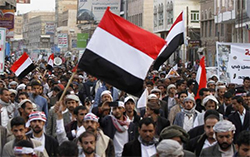 |
On September 21st, 2014, Sana’a, the capital of Yemen, was taken over by “Houthi’s”, a hardline Shiite faction, led by. The faction seized vital government ministries and buildings, military bases, Sana’a’s international airport. It also has been reported that the homes of government and military officials were raided, and government paid preachers in masjids and elsewhere, were replaced with their own. Interestingly, there was no resistance from the government i.e. the military, the police or any other faction for that matter; and the Houthi’s just glided to annex the power halls of Sana’a.
Bolstered by the continuous dismal government performance and an extremely discontent population, the Houthi’s gained significant support of the population by successfully organizing strikes, peaceful protests, and even armed skirmishes to destabilize the central government, their fighters also scored a string of victories in the north, defeating mainly hardline Islamist fighters. Al-Houthi rallied the support of the population and succeeded in delegitimizing any intervention of the army. This summer, after the government cut fuel subsidies, fuel costs shot up 90 percent, there was significant anger among the masses which the Houthi’s capitalized and over ran Sana’a without any major opposition. There have been allegations of the armies’ connivance with the Houthi’s, however, nothing concrete has come to surface. This abrupt transferal of power forecasts serious repercussions for Yemen will not only affect the regional dynamics, the international community will have serious concerns and shall be keeping a close and vary eye on how events progress.
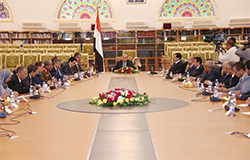 |
One of the main demands of the Houthi’s was the resignation of the Prime Minister, Mohammed Basindwa, which after the September 21 assault on the capital; was achieved. The Yemeni Prime Minister resigned, Yemen’s President, Abdu Rabbu Mansour Hadi, ended up dissolving his government. This dissolution put Yemen’s powerful Sunni political party, al Islah, out of power. To avoid anarchy, the President and other political parties sat down and negotiated the terms of governance, an agreement was reached; Houthi tribe’s Saleh el-Samad was appointed the President’s adviser. Popular committees are now overseeing ministries, especially the finance ministry. "Peace and National Partnership" agreement, which had been negotiated, was signed. . As a major gesture to the public, the government agreed to cut fuel prices by 25 percent. The al Houthis supported by the Southern Movement, both of which have long been excluded from Yemeni politics, now have broad powers to shape Yemen’s future government. thousands of armed Houthis remain in the capital, manning checkpoints, controlling access to government buildings, and asserting control of government institutions and finances.
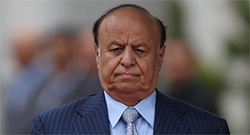 |
However, the power sharing understanding between President Hadi and Al Houthi’s came to an end on the 22nd January 2015, when President Hadi resigned from the top position followed by his cabinet; thus further deepening the turmoil that has been persisting in the country. The crisis packed tenure of President Hadi’s saw him not only struggling externally with the Houthi’s, but also internally with the ex-ruler’s, Ali Abdullah Saleh’s, loyalists in the government. The official statement, coming from one of Hadi’s advisers, Sultan al-Atwani, says that mass resignations resulted from frustration over the Houthis’ stripping the president of all powers — including over the military and intelligence agencies — even though they had signed the power-sharing deal.” And, “Hadi has lost control of the military. He doesn’t have the power to give orders to the military”. Meaning; the Houthi’s practically stripped the president of all his powers, leaving the presidency as merely a symbolic state of existence.
However, the unofficial factor cannot be undermined in the failure of President Hadi’s government. It is an open secret that ex-president Ali Abdullah Saleh enjoys immense influence with the politicians, beaurucracy, law enforcement agencies and the military. During his rule of 30 years, he has placed many family members and die hard loyalists in key government positions; and has maintained this network even after his ouster. Furthermore, he was a key US ally. Many Yemenis even suspect Saleh aided the Houthi advance and plotted against the president.
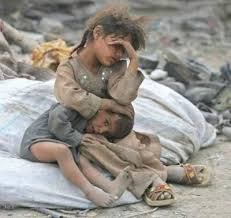 |
Yemen is the second poorest Arab state after Mauritania and is plagued by a tumultuous past of 11 civil wars since 1948, from which it has never recovered. Contrary to the popular belief at that time, the unification of North Yemen, which was initially part of the Ottoman Empire, and South Yemen; a British colony, in the 90’s, did not bring any real relief and prosperity to the common Yemeni. The country faces dwindling oil and water reserves, its tourism and construction industries remain paralyzed, a third of the 25 million people live under the poverty line of $2 a day, unemployment is estimated at around 35 percent – with youth unemployment at 60 percent. The nation is heavily dependent on the countries’ declining oil resources, foreign aid from multilateral agencies, friendly countries and remittances from Yemeni workers working abroad for 90 percent of its food and almost all of its medical needs.
Even though Yemen is not a major oil producer like other Middle Eastern countries, and is not a part of OPEC, its government bases 60 – 70 percent of its state budget income crude oil export, however, the countries income is continuously being sapped by bombings of oil and gas pipelines by insurgents, militants and/or disgruntled tribesmen. According to the Oil & Gas Journal, Yemen had proved reserves of oil totaling 3 billion barrels as of January 2014, however, the U.S. Energy Information Administration estimates that Yemen's crude oil production was about100,000 bbl/d (barrels per day) in March 2014. Most of Yemen's production is from the Marib-Jawf area in central Yemen and near the Masila area in the east, with production coming from just 13 of the country's 105 exploration blocks.
The impoverished nation can be effectively divided into at least four segments: the north where Houthis, comprising 30% of the Yemeni population; form the biggest armed group, and over the past few years have emerged as a new power player with a strong militant force with a political agenda; Aden and part of the south, where the secessionists of the Al-Hirak movement have most of the guns; the Hadhramaut, where extremist militants linked to Al-Qaeda are on the rampage; and finally, a few isolated pockets where tribal chiefs still exercise some authority.
During the Cold War, Yemen was split into two countries; Ali Abdullah Saleh became the ruler of the North Yemen in the late 1970s and has ruled the whole country since unification in 1990. Yemen also experienced its Arab Spring, and protests were held in Yemeni cities almost at the same time when Egyptian Arab spring had started in January 2012.
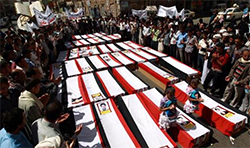 |
But as protest movements in Egypt, Tunisia, and Libya yielded political changes to an extent; Yemen’s protests grew bloodier, as they were hit by crackdowns that kept getting more violent. Then on Friday, March 18, (allegedly government) snipers killed at least 52 protesters with live ammunition, which turned out to be the turning point for the Yemeni Arab Spring. The European Union and United Nations Secretary General Ban Ki-Moon condemned the attack, Saleh unpopularity grew manifold with the Yemeni populace, and the dictator's 30-plus-year rule started to fall apart.
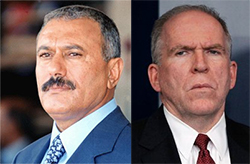 |
Secret State Department cables released by Wikileaks show that Saleh worked extensively not only to help the US strike against its enemies in Yemen, but also to cover up America's role in his country. In a September 2009 meeting with John Brennan, the Obama administration's top counterterrorism adviser, Saleh reportedly offered the US "an open door on terrorism." In practice, as the Guardian explains, "Yemen has restricted access for US forces in order to avoid playing into the hands of Saleh's domestic critics." In other words, Saleh agreed to let Americans continue bombing his country, and agreed to continue concealing it.
Coming back to the present, the sudden power shift to the Houthi’s has broad repercussions for Yemeni politics and for regional dynamics. The Yemeni political elite bought into the 2011 political transition process after the Arab Spring that deposed then-President Ali Abdullah Saleh from power. The political transition kept a modicum of stability within Yemen and offered each political faction various opportunities to secure its own interests. Opposition forces, such as the al Houthis, southern secessionists, and a youth movement, elected to participate in hopes that they would be able to influence the process as well. The al Houthis, warily participated in the Gulf-backed National Dialogue Conference (NDC), a forum designed to air and finally address national grievances and a mechanism to limit the influence of Yemen’s entrenched political elites. Yet, historical Yemeni powerbrokers continued to dominate state politics and the government. These include the al Ahmar family, which dominates one of Yemen’s two northern tribal confederations; General Ali Mohsen al Ahmar (not related), who led the Yemeni military in its six wars against the al Houthis; and Saleh’s party, the General People’s Congress.
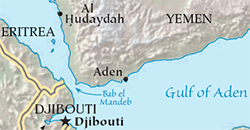 |
Yemen’s main importance in the world map is the Bab el-Mandab, it is a key chokepoint in international shipping, makes Yemen important in terms of international energy trade. More than 3.4 million barrels of oil per day (bbl/d) passed through Bab el-Mandab in 2013. Closure of the two-mile strait would force tankers to sail around the southern tip of Africa to reach European, North American, and South American markets. And since the Shiite and Sunni animosity runs deep in the middle east, and this development has led Yemen to be viewed as an advancement of Iranian Hegemony in the region. A Houthi-controlled Yemen could evolve into a full-scale Iranian stronghold in the future and it may put the movement through the Bab al Mandab Strait, the gateway to the Red Sea and a vital sea route between Europe and the Far East, under Iranian control. The straight of Hormuz already under Iranian control; control of two sequential straits would give Iran a lot of power.
The takeover in Yemen is of great importance to the international community; its significance goes far beyond the future of Yemen. Whether intended or not, the Houthi’s have set a ball rolling for a series of events that could prove extremely detrimental to Yemen’s unified existence. The fact of Al-Houthi’s being a Shiite faction, have already started to ring alarm bells in the Middle East region, mainly the Sunni countries, while Iran is all too happy with the development. Despite not having a history of sectarian discord, it would not be wrong to say, that Yemen is another victim of the Cold War between Saudi Arabia, Iran and their respective allies, and the constant struggle for hegemony of the Sunni-Shia power dynamic. Apparently, Yemen may well follow the path of other Arab Spring countries such as Syria, Iraq and Libya. The current conflict in Yemen is but another expression of the wider sectarian struggles currently destroying the Middle East’s heterogeneous nation-states and could foreshadow the emergence of new political entities based on political Islam and in some cases along ethnic and sectarian lines.
 |
While Iran, a country that seeks to be the region’s most formidable power, is delighted at Yemen’s new rulers and could use the opportunity to expand its influence further in Yemen. The reaction of Yemen’s close Sunni neighbors is interesting. The Gulf Cooperation Council’s (GCC’s) has warned that it will not stand idly by and observe events in Yemen. This is quite ironic, since Yemen is not part of the GCC and in fact has been continuously denied membership. So this statement of theirs reeks with their fear of Iran gaining a stronghold in another country of strategic importance. With the Houthi takeover, choices for the GCC are limited. Direct military intervention is not being considered, and the options are limited. A political solution remains the best option for bringing together the various Yemeni forces, and to unite them against the Houthis and al-Qaeda by adopting a political project that excludes the rebels and their supporters and punishes them economically. The second option that could complement the first would be to back the Yemeni army by restructuring it, arming it, and enabling it to regain the cities from the Houthis.
Both the options if adopted by the GCC will lead to civil war, with mammoth odds of repartition of Yemen. There already have been reports on sporadic clashes and skirmishes between Al-Houthi’s, Sunni’s belonging to Islah Party, which is a Muslim brotherhoods branch in Yemen, and the Al-Qaeda sunni extremists in the South. Unfortunately, keeping Yemen united does not seem to be in any factions agenda, and they all would be more than happy to be divided and rule their own small pieces of land.
In an analysis of scenarios for Yemen’s future, Abdulbari Atwan, editor of the English-Arabic Al-Rai Al-Youm newspaper, has listed four probable consequences of the current debacle:
- The Houthis could take over power and return imamate rule, just like the pre-1962 revolution period.
- Yemen could end up with an Iran-style theocracy: Abdulmalik Al-Houthi could [end up] ‘a supreme guide,’ copying Ali Khamenei in Iran. This scenario refers to the allegedly strong connection between Iran and the Houthis. They have been accused of providing arms, financial support, and even training for the rebels.
- The actual President Abd Rabbo Mansour Hadi could become a puppet President for the Houthis, maintaining his formal title but taking orders from the Houthis, who will be the real decision makers.
- Chaos and disintegration of the state. The Houthis have no interest in ruling the south in the midst of a growing secessionist movement, so the Houthis in this scenario would grant the south independence and focus on the north and the areas bordering the Arabian and the Red seas. Of the four scenarios the last is the most likely.
So does anyone really care about Yemen? Apparently, there is a lack of commitment and resolve by national and international stakeholders for unity, peace and stability for Yemen. The international community must realize that focusing on the piece of cake that best suits their interests; and their whole policy making and strategies being based how to grab their share, will only leave a more precarious world for our next generation and the generation after that. The OIC has yet to measure up to its vision and objectives of creation; the Muslim countries have been not only engaged in their internal and external security threats; but also an international negative propaganda that has severely affected the mindset of the world no matter what religion they belong too.
However, having said that, being an optimist, I firmly believe that the situation for Muslims and Muslim countries all around the world can change for the better. We need to work hard at every level for unity. We need to set our differences aside, and really work hard to reach out and make strong bonds; to truly become Muslim brothers, and Muslim brother countries. It is the call of hour, it is the necessity of the hour.
|
